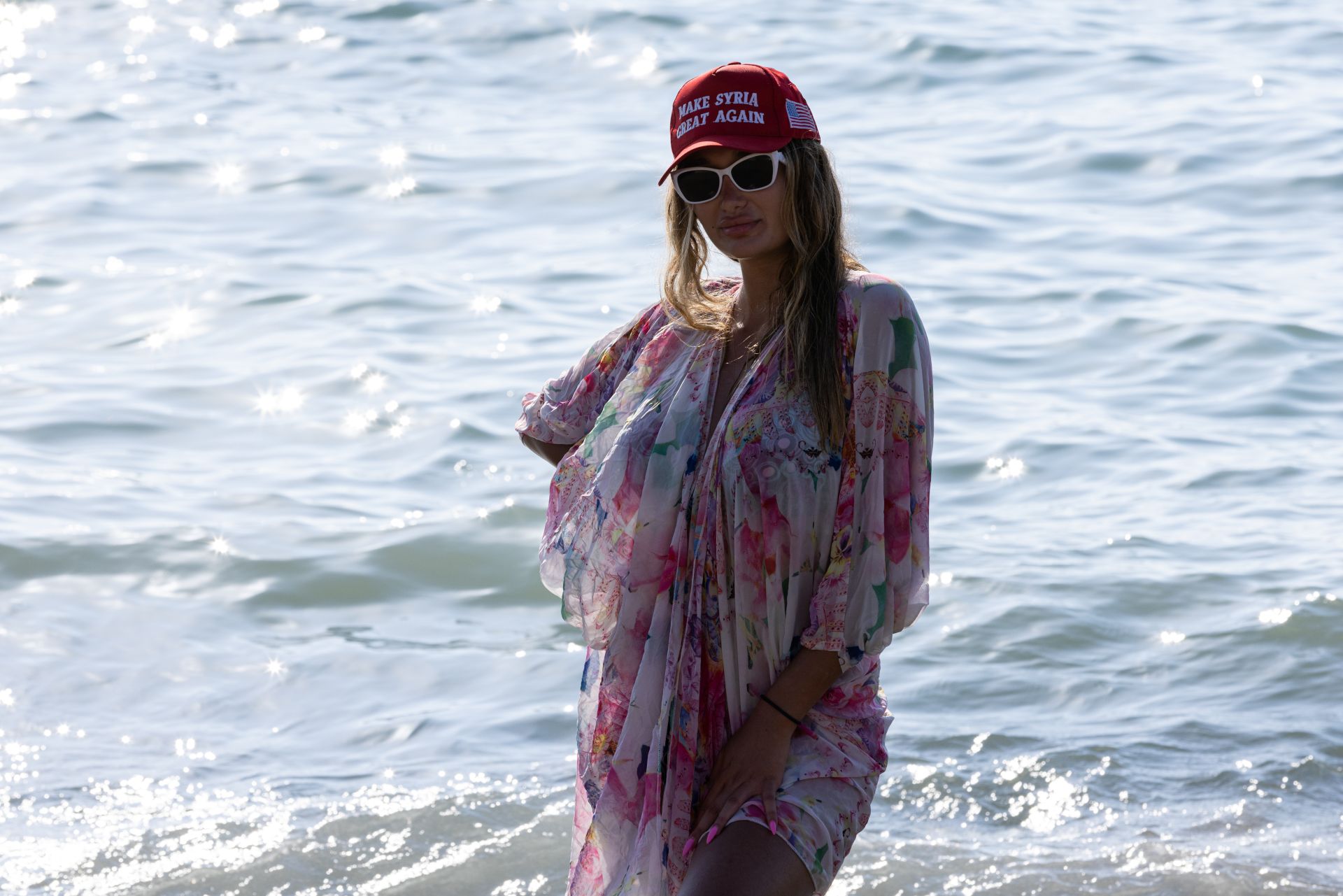She has just turned 25. Violet nails click on her phone screen, her eyes hidden behind skinny black shades. A tattoo of the sun and moon runs across her shoulder. Her lips are plump, her smile bleached. A small nose piercing catches the sun.
For her and others, this summer has felt different: Hopes of rebirth have intermingled with fears throughout the fragile transition following Bashar al-Assad’s fall in December 2024. Optimism rose after President Donald Trump’s surprise announcement in May 2025 that he would lift U.S. sanctions on Syria, followed soon after by European countries’ own announcements, fueling the dream that the country might emerge from isolation and tourism might finally return — a dream of Syria 2.0.
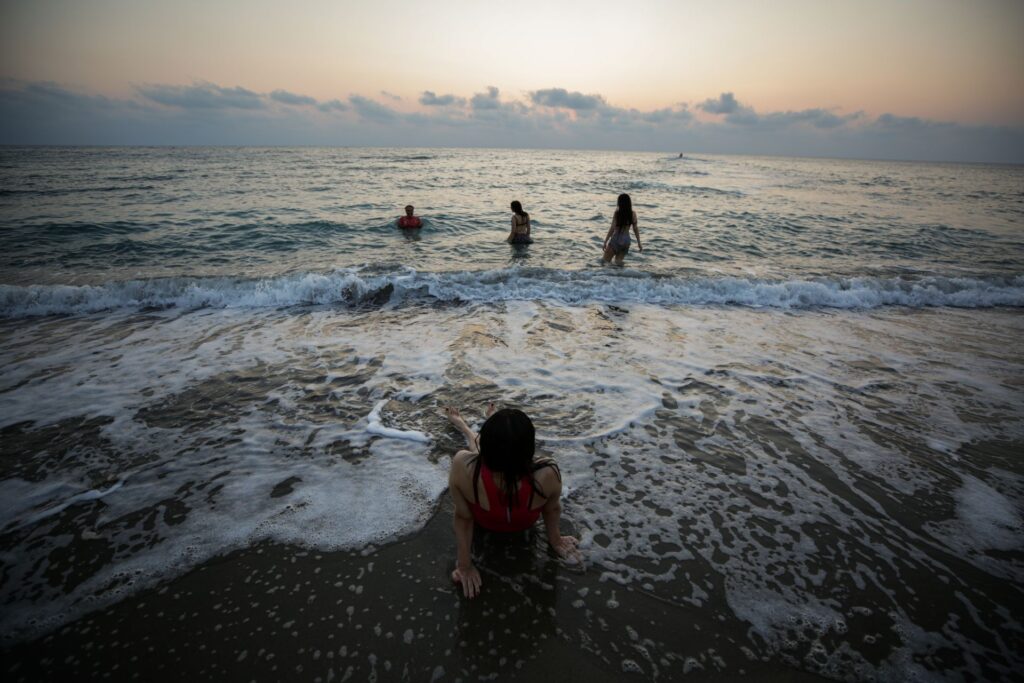
Her name is Rama Mahmoud, and she is an influencer from Tartus. Since 2019, her 44,000 followers have been scrolling through sunsets, outfits and waves. In June, she posted a video: a pale green one-piece on a boat, behind her the new Syrian flag with three stars. “Also this,” she told her audience, “you can enjoy life here.” The setting is Wadi Qandil, a strip of turquoise water and wild mountains 20 miles north of Latakia.
It was the first time since Assad’s fall that she had returned to Wadi Qandil, a beach she had discovered three years earlier. At the time, only a small group dared to set foot there. At first, Rama hesitated — she admits she was afraid after Ahmad al-Sharaa, a former Islamist rebel, took power. But she soon decided to show another Syria. Her feed became an invitation: Come see this place, come see this Syria. These content creators come to the beach not only because it’s Instagram-worthy, but also because the bar owners invite them, in exchange for visibility.
Parties were never absent here, even during the war. The coast remained a playground for those who could access it. Nestled between the hills that border the Mediterranean, Wadi Qandil was long reserved for the elite. Ahmad, a local guide, recalls bringing Polish tourists in the 1990s, under the late President Hafez al-Assad: “The Republican Guard controlled the entrance, there were Russian diplomats. Topless was allowed.” Just 5 miles away stood Burj Islam, where the Assad family owned a vast private estate: a white villa, gardens and direct access to a beach closed to the public for decades. “We would see their boats and Jet Skis when they were there,” recalls a woman whose husband owns chalets nearby.
Rama comes almost every weekend in summer, often to X Beach, one of the coast’s trendiest bars. Rasha, another influencer, speaks of its potential and hopes for investment to “keep this place of freedom alive.” Marah Daoud, a 31-year-old Alawite DJ, has barely arrived before swapping her loose clothing for a sheer T-shirt over a bralette. “It’s the only place on the coast where I really wear whatever I want,” she says. Dressing modestly is rooted in a Syrian culture that remains traditional, and this place is an exception.

Their posts are bricks in a fragile construction: a bubble where Syria looks almost like Ibiza, and where living one’s sexual orientation feels a little freer — especially for the LGBTQ+ community. “Here we’re free to be ourselves. I’m gay — I can live openly here, dress how I want, but we know it’s a privilege of high society,” says a frequent visitor to the beach.
But this Syria is not just improvised by young women with phones. Behind the scenes, someone is pulling the strings.
He is Amro Tozan, an entrepreneur from Damascus who dreams of turning this hidden beach into a Syrian Santorini, that Greek island emblematic of paradisiacal beaches. He owns the X Beach bar and resort and, to achieve his goal, he knows he needs content creators. Each selfie, each reel, becomes part of his gamble: to rebuild tourism, to sell a paradise that stands on a knife-edge.
A ginger cat called X lounges at Amro’s feet. Tanned skin, sunglasses, floral summery shirts — he has taken on the colors of the bubble. He has two business partners, Sam and Morad, the managers. After the parties, they eat fresh fish while watching the sea. The trio are characters. Morad, with colorful glasses, loud shirts and a booming laugh, looks like an Italian mafioso and is quick-tempered. Sam is the calm force, always present.
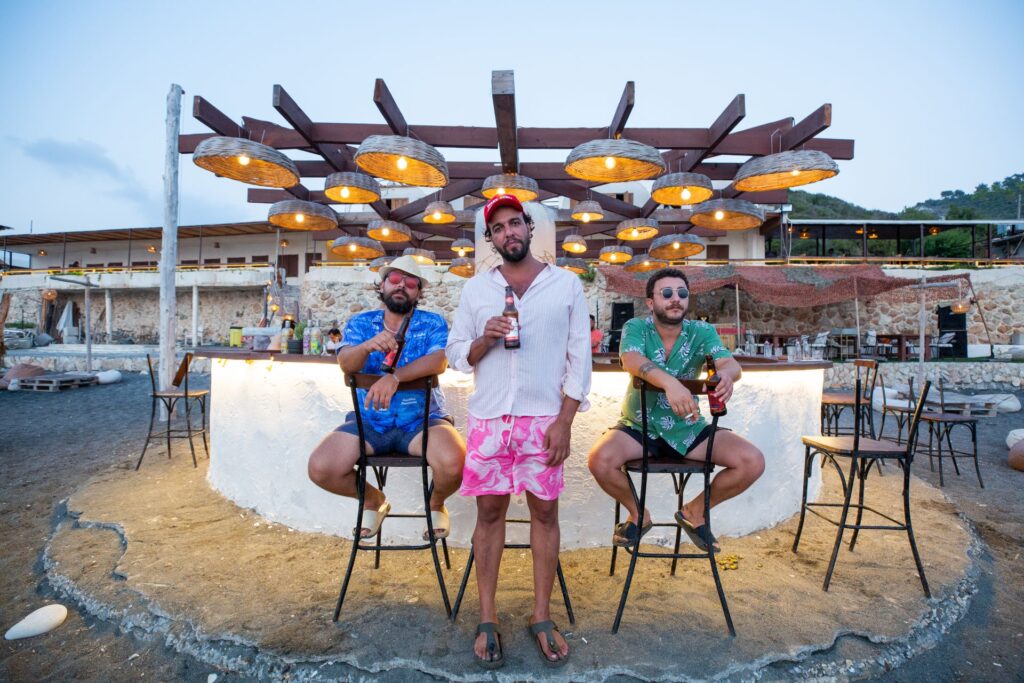
Three years ago, Amro left Damascus and sold his bars in the capital. He saw Wadi Qandil beach and fell in love with the Mediterranean gem. He took over the bar, with big dreams for it. He calls it “a small place that feels like a big place.”
But in July 2024, a member of the shabiha, Assad’s violent enforcers, took it from him. “When a shabiha wanted something, he didn’t even need to threaten you. I packed my clothes and went back to Damascus.” He handed over the keys. For four months, he watched the place decay. His 20 staff — including the bartenders and two managers, Sam and Morad — left X Beach, refusing to stay with the self-proclaimed new owner. Sam and Morad are both Alawites, like the shabiha member who seized the bar and the Assad family, which often favored members of the sect. Amro, a Sunni, was the one pushed out, yet his Alawite colleagues chose to leave with him. Sam and Morad remember the insistent calls. They didn’t respond. They would not return without Amro.
Morad had evaded military service, mandatory in Syria under Assad’s dictatorship during the war, by hiding, dodging checkpoints and often using his cousin’s ID because he looked like him. After eight years underground, he knew how to avoid the authorities.
Amro had already clashed with Assad’s regime. He spent time in prison in 2017 and again in 2024, for three months and one month, respectively. In 2017, he helped a journalist report on parties in Damascus but also showed them Jobar, the bombed-out neighborhood. “I didn’t want it to be just ‘Damascus parties’ while there were airstrikes next door,” he said. It cost $200,000 to get him out.
The day Assad’s dictatorship fell, Amro rushed back to X Beach. The shabiha were gone. It was time to start over. His investments were gone, but he didn’t care. His dreams were even bigger now. With sanctions lifted in May 2025, the new Syrian leadership found breathing room, and Amro believed that Syria would emerge from isolation, and that tourism, halted by war, could restart.
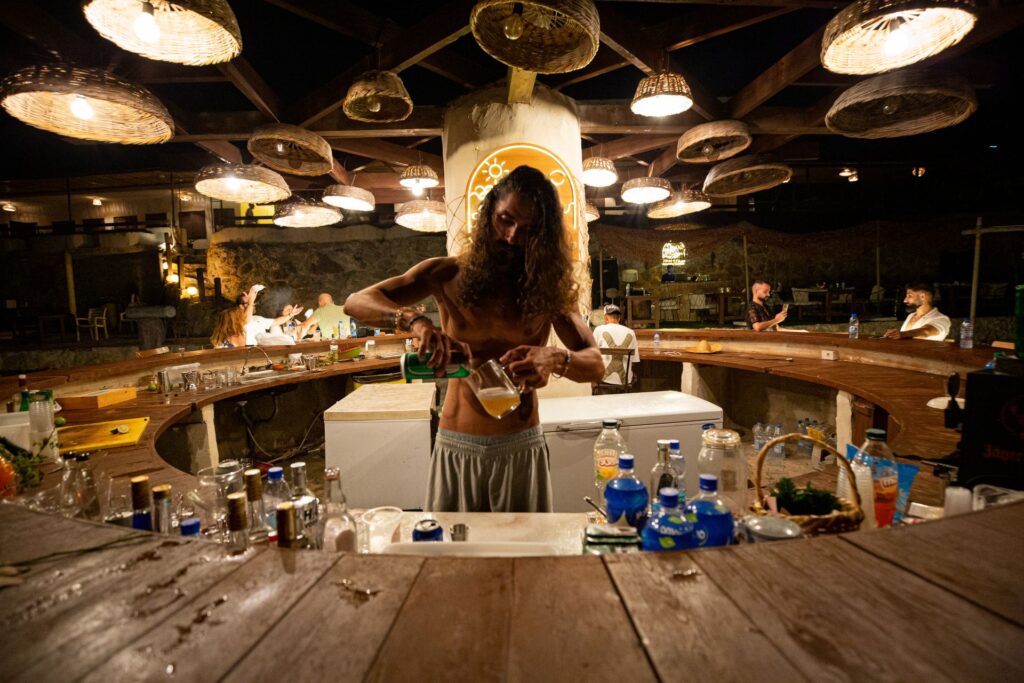
Fueled by dozens of videos and posts about Wadi Qandil on social media, Thursday night parties attract Syrian youth beyond the usual circle. Music clips are filmed on the beach, and countless selfies are taken on the shore. Rooms are offered to influencers in exchange for exposure. Sam took charge of this.
“We want to show a beautiful image of Syria,” he tells me. “We show there are parties, cocktails and a magnificent sea. We bring people here. I contact them through social media. We give free drinks, free rooms, and we know they’ll post images that attract more people.” The bubble began to grow. They wanted to make the place trendy, to attract locals — and also internationals, though for now only a few foreign adventurers come. Parties spread across social media.
Amro provides the stage, but it is the influencers who give it a face.
At the beach at the end of July, Rasha is switching looks. Her second of the day is a white off-shoulder dress paired with oversized pink sunglasses. Barefoot, she walks along the sand, behind her a turquoise sea with restless waves, salty spray in the air. She takes off her dress to snap selfies in the sea, wearing her floral swimsuit, posing with ease and confidence. She is 33, with 226,000 followers, half-Sudanese, half-Syrian, with brown hair, brown eyes and a necklace of white pearls. After Assad’s fall, she too posts about Wadi Qandil, which fills her Instagram feed. The messages pour in: “Where is this place?”
She is aware of the 14 years of war in Syria, and also talks about the civil war in Sudan. But she is also a writer and wants to show that Syria is not only a war. She began on social media in 2016, posting photos in flowing dresses and hats that evoked a princess-like allure. This part of Syria’s coast, the old Assad bastion, was not accessible to people living in areas outside regime control.
But the party is never far from collapse. Outside the bubble, the country still bleeds. In March, reality struck home. Over 1,000 people were killed in four days of fighting in the coastal region after an Assad loyalist attack. A wave of massacres followed, targeting Alawite civilians in revenge.
Amro helped Alawite families relocate safely to Damascus. They sheltered people at the hotel. He is Sunni, like those currently in power, whereas the targeted community was Alawite. “It was the first time I felt that, because I’m Sunni, I was protected, and it’s absurd.”
After this, trust in the new Syrian authorities plummeted, especially on the coast. A United Nations commission found that several armed groups affiliated with the interim government forces committed widespread and systematic sectarian violence — carrying out executions, torture and looting against Alawite civilians. “I’m Sunni and I have problems trusting the new authorities, so imagine the other communities,” Amro says. For X Beach’s security, he hired young men from Idlib and more traditional Sunni areas.
The massacres left scars deeper than the sand could hide. Even families who had come for years started to feel afraid.
On the beach, an Alawite family from Latakia heard about Alawite girls being kidnapped. After the March massacres, the parents deleted their 15-year-old daughter’s Instagram and Facebook. For 12 years, they had come every Friday during the summer. “Last year, we left at midnight; now we leave before nightfall.” The daughter shows open hostility to the flag: “Dangerous, negative-feeling; the old flag was positive. … No one asked us if we wanted this flag — everything is imposed by force.” And the old one? “It was our country,” she says, in the past tense.
On June 29, six men from the coast guard, rifles slung, arrived from the sea with sirens screaming. They stepped onto the sand, salt spray clinging to their uniforms. One barked: “Salsa is haram.”
Just one day earlier, clips of cocktails and couples dancing salsa barefoot on the sand had circulated online. The armed men also pointed out that there was no license for alcohol. For a moment, the beach froze. Amro stepped forward. He spoke quietly, negotiated and calmed them down. After a few tense minutes, the armed men backed off and the party resumed — for now. For Amro, it was just another reminder: Paradise here is always provisional.
Amro knows this dance with authority. Under Assad, the shabiha came to his parties; the old regime flag hung above the bar, and he accommodated them. He does the same now. He smooths things over, and later the governor confirms: It is not their jurisdiction.
This summer’s crowds have thinned, yet Syria’s youth have kept coming back — hesitant, defiant. Still, the contradiction gnaws at Amro. “We face a dilemma,” he admits. “The more we post, the more people want to come. But the same images can bring us trouble.”
Amro has another reason to keep the bar alive: “We are the only ones resisting — for me, we’re the last domino holding against this ideology.”
He also thinks the so-called “felool,” remnants of the old regime, dislike it: “They don’t like to see us throwing beautiful parties under the three-star flag because it cleanses the image of the new authorities. I think some of these attacks, like the coast guard raid, could be paid for by the felool because they don’t want the new Syria to work, nor the country to get better and attract tourism.”
Amro adds: “It’s not that we fear the government, but we fear no one seems in control. For me, there are two camps: those who reference the Quran, religion, and those who believe in a state.”
On the beach, Ammar, 28, his body sculpted from long hours at the gym, talks about investing here. “I’ll wait and see what happens in the next three, four months.”
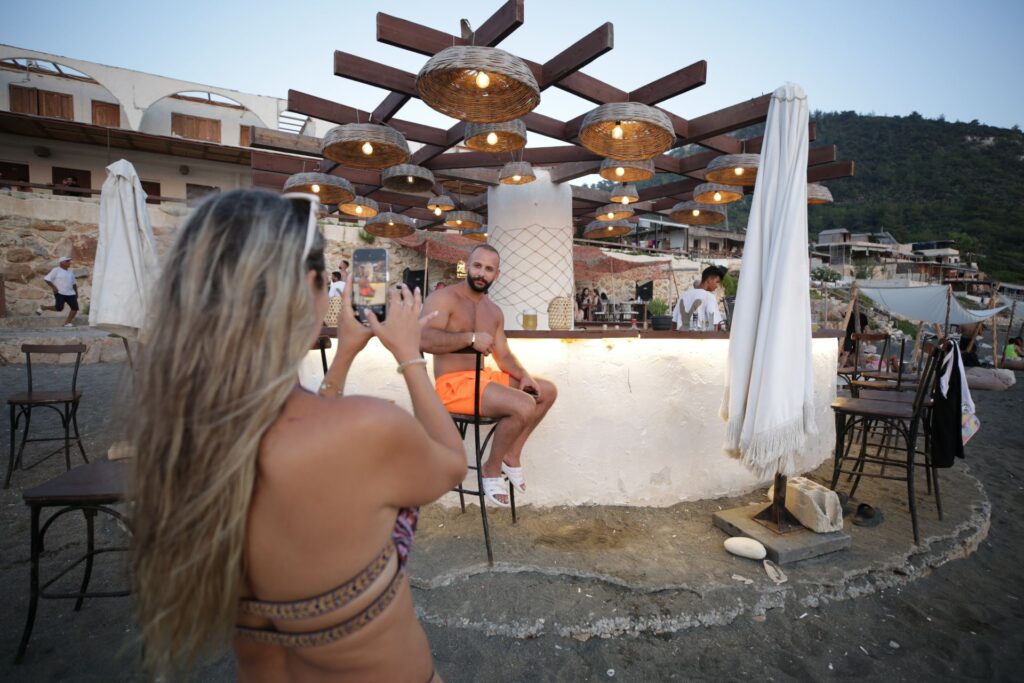
“I’m trying to trust the government and believe in a bright future for Syria, even if, after Sweida, it’s hard,” Amro says, referring to clashes in southern Syria at the end of July, which left 1,200 dead in eight days and involved Druze, government forces and Bedouin.
But, still, he stays determined: “I bet on this place.” He insists: “I have two options — close or stay and see what happens. I like betting.”
At sunset, a shirtless man rides a brown horse along the beach under cloudy skies. A Jet Ski is in the distance, and a boat, Shakira’s voice carrying over the waves. Amro is wearing a red cap labeled “Make Syria Great Again” as he spins tracks. Rasha, in a red dress, twirls. Rama films with her phone.
Midnight swims, beers, bonfires, glowing plankton — stories pile up, reels in endless flow. Posts feed the bubble: Wadi Qandil becomes a showcase and a refuge, a marketplace of images and a bet on the future. For Rama, Rasha, Amro, Sam and Morad, every post is an act: to attract, to protect, to defy. To show just enough to spark desire, but not too much to provoke, trying to transform Syria one post at a time.
But on Sept. 11, a statement was published by the governorate of Latakia indicating that X Beach was temporarily closed for “administrative paperwork.” Many believe the closure was due to the large parties the bar hosted at the end of August and early September. The owner is trying to reopen it as soon as possible.
Become a member today to receive access to all our paywalled essays and the best of New Lines delivered to your inbox through our newsletters.



